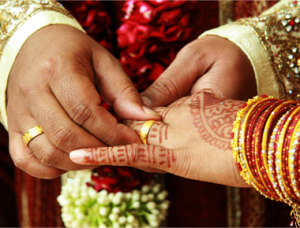Hindu Wedding
The Hindu Wedding Ceremony is steeped with tradition, symbolism, and beautiful meanings. I conduct traditional Hindu Wedding ceremony in accordance with the Vedas. I recite the Vedic verses & Shlokas in Sanskrit language and explain their meaning so that the couple can understand the commitments they are making. Although the basic marriage ceremony is same across the breadth and width of India, the details can be different because of specific regional, local and even family traditions.

Stages of the Hindu Wedding Ceremony
Ganesh Puja
All auspicious ceremonies begin with a prayer to Lord Ganesh requesting him to remove any obstacles which may arise during the ceremony.
Grah Shanti
This is a prayer to the nine planets (Nav Grahas) of our solar system. The Navagrahas, affect our karma, our desires and their outcomes. Each of these nine planets exerts an influence in our lives, mostly positive, which can be known from one’s horoscope. Navagraha Pooja is undertaken to reduce their negative influences. We do Yagnya or Havan to please these heavenly bodies and pray to remove any negative influences in the bride’s or groom’s path by singing their praise and offering ahuti to the Agni Lord.
Welcoming of the Groom
The bride’s mother performs a welcoming ceremony and will playfully try to grab the groom’s nose. This tradition reminds the groom that he has come rubbing his nose at their door asking for their daughter’s hand in marriage. The ceremony signifies an attempt to drive away evil spirits.
The father of the bride washes the right foot of the groom with milk and honey.
Arrival of the bride
The bride escorted to the mandap by her close family members, maternal mama and brothers.
Varmala (Garland) A loop of white cotton wound 24 times, symbolizing different characteristics and virtues of human life, is placed around the shoulders of the bride and groom. The threads bind the two together to fulfill their roles fully and sincerely.
Kanya Daan (Entrusting of the Daughter)
The bride’s parents give their daughter to the groom by putting the bride’s right hand into the groom’s hand while reciting sacred vows.
Laja Havan (Offerings to the Fire)
Three obligations are offered to the sacred fire. The brother of the bride gives the couple rice, and offer the fire. This signifies that the couple is willing to sacrifice all of their worldly possessions because there is not anything greater and more rewarding than receiving God’s blessing.
Mangal Phera (Holy Steps around the Sacred Fire)
The couple walk around the sacred fire four times, signifying the four basic human goals of dharma (virtue), artha (wealth), kama (family), and moksha (enlightenment). As a fun tradition, at the end of the rounds the bride and groom will run to sit down. It is said that the one who takes a seat first will have the upper hand in the household.
Sapta Padi (Seven Vows)
The bride and groom take seven steps together while they recite each of the seven vows:
- The first step is taken to earn and provide a living for their household or family.
- The second step is taken to build physical, mental, and spiritual powers and to lead a healthy lifestyle.
- The third step is taken to earn and increase their wealth by righteous and proper means.
- The fourth step is taken to acquire knowledge, happiness, and harmony by mutual love, respect, understanding, and faith.
- The fifth step is taken to have children for whom the couple will be responsible and to blessed with healthy, righteous, and brave children.
- The sixth step is taken for selfcontrol and longevity.
- The seventh step is taken to be true to each other, loyal and remain lifelong companions by this wedlock.
Mangalsutra (Sacred Necklace)
The groom promises lifelong protection by offering a mangalsutra (sacred necklace) to the bride and placing kumkum (red colored powder) on the crown of his wife’s head. These two offerings signify the mark of married women and serve as a symbol of the husband’s love, integrity, and devotion.
I provide traditional Hindu wedding service tailored to your personal requirements, family traditions with all vidhis and mantras.

